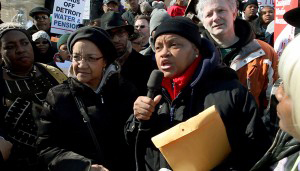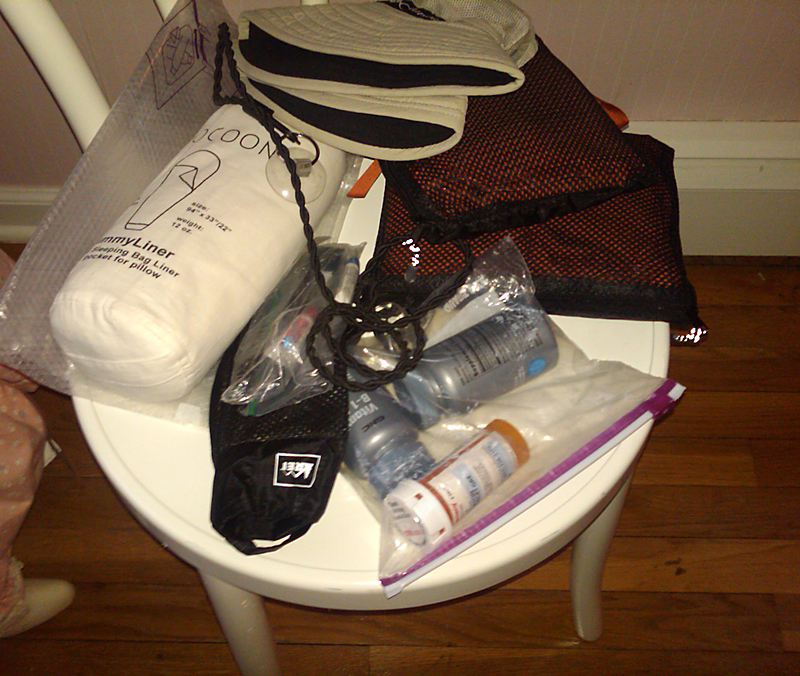Tag Archives: protest
I’ve been to quite a few screenings over the past year of our feature documentary, Opening Our Eyes and it has been an interesting experience. What I love the most are the questions and comments that come up in the Q&A after the screening. The most asked question is “How did you pick your subjects for the film?”
I could write an entire bog about how we picked our subjects (and may have already), but the simple answer is that I sent out an email to everyone I knew asking them if they knew or knew of people – individuals – on all 6 continents – who were making a positive difference in the world. The response was overwhelming and I still have folders of subject ideas that I would love to do short stories about if I can find the funding and the time.
My daughter and I waited until we got back from our round-the-world trip to decide on our North American subject(s) and ended up shooting that segment 4 months later. Surely we were in a different frame of mind and it shows in the piece – it’s a big edgier and less optimistic, but then again it is a story about two women, Maureen Taylor and Marian Kramer,  working against all odds in the inner city ravages of Detroit. They are volunteers and street activists – the “voice” for the poor and disadvantaged of their community.
working against all odds in the inner city ravages of Detroit. They are volunteers and street activists – the “voice” for the poor and disadvantaged of their community.
Many times when I’ve screened the film, folks want to know why I chose that story to be in the film and some tell me I should take it out – but I won’t. We have edited this segment when we cut the film from 76 minutes to 61 minutes. In the process, we “toned it down”, but I didn’t do that to appease the crowd, I did it because our subjects were good and caring women who were passionate about their cause and I wanted the audience to like them. I also wanted the audience to listen to what they were saying, rather than get defensive and tune them out.
Ultimately the Detroit segment has what every good story needs – conflict. But it also has hope for a better future. This segment is different from the other stories in the film, in that it’s not about giving children and teens a home, or rescuing food or saving the environment, but it is about something that is equally important and that is giving the people a “voice”. Without that, there is no hope for hundreds of thousands of disadvantaged people in America.
Being able to have our voice heard is perhaps the most important privilege we have as citizens of this country or any country for that matter. If our “voice” gets silenced, or restricted, the rest of our freedoms will be in danger. Maureen and Marian understand the importance of using their voice. I do as well, and that’s why that story “stays in the film”.
I walked into my daughter Erin’s room this morning and my eye caught sight of a chair in the corner of the room left as it was 6 months ago, when we returned from our global adventure. Piled high on the chair were the remnants of that trip, empty malaria pill and vitamin B-1 containers, a mummy sleeping sack, a travel towel, clothesline and sun hat.  The image of those items is lingering in my head and in a way is symbolic of the end of the first chapter of this documentary.
The image of those items is lingering in my head and in a way is symbolic of the end of the first chapter of this documentary.
I have just returned from Michigan where I rendezvoused with Erin to film our North American subjects. I say subjects because there are two. Two women, Maureen Taylor and Marian Kramer, who are speaking up for the disadvantaged of Detroit who have nowhere else to turn. Maureen and Marian have been fighting for people who can’t fight for themselves for over 25 years.
Maureen, Marian and others work for Michigan Welfare Rights Organization as volunteers. Everyone refers people who need help to Maureen and Marian from the Mayor’s office to the City Council. They have become the safety net of the poor in the City of Detroit and these days, a very large safety net is needed. They deal with basic human needs for survival – food, heat, shoes, eviction notices – the list goes on and on.
The day we spent with them in their offices, they took call after call, helping people find a way to pay their utility bills. It was February and one of the most brutal winters in a long time. People were facing their power shut off. Having no heat can be a matter of life and death for the elderly and young children. Call after call, Marian and Maureen helped the people who have been forgotten.
The next morning, we headed to Lansing, Michigan’s State Capitol with hundreds of others to protest against a bill that will sell Detroit’s water assets to private companies. Thousands of people in Detroit have had their water turned off already. Can you imagine going through your daily routine and not having running water? Erin and I experienced that in many places on our travels this summer – in Nepal, in Thailand and in Africa – but this was a major city in the United States. So as people are doing in Wisconsin and Egypt, they are speaking out. Not for handouts. But for basic human rights.
It’s hard to fight the good fight because there are so many ups and downs along the way. But there are always people who are so committed and so on purpose, that they somehow find a way. That is what this film is ultimately about. It’s about believing that the impossible is possible. It’s about creating awareness because that brings hope and hope brings change. And it’s about believing in ourselves and the power within us and the power in the individual in creating change. When we leave our egos behind and expand to see others, we all have the power to make a difference, not just in others’ lives but also in our own.
So, in a way this is the end of this chapter. We have found our subjects and gathered their stories. The shoot is finished. But as I write this, I know in my heart that there will be more stories to be captured and shared.











